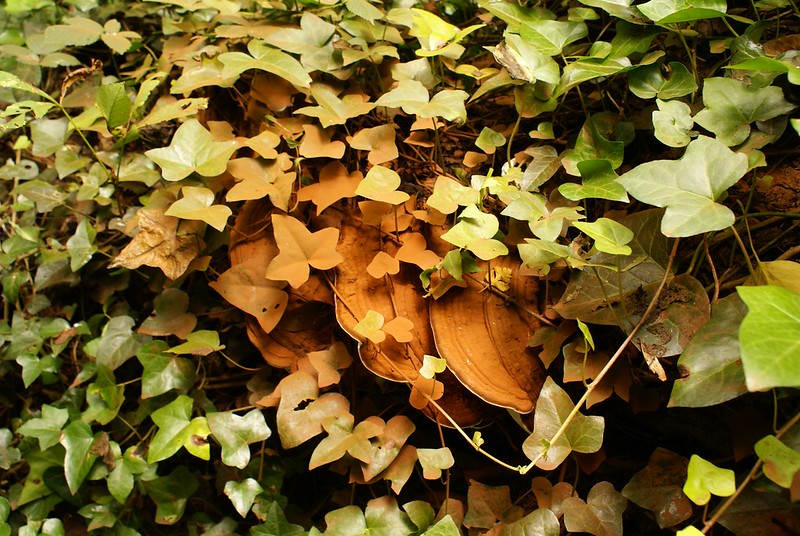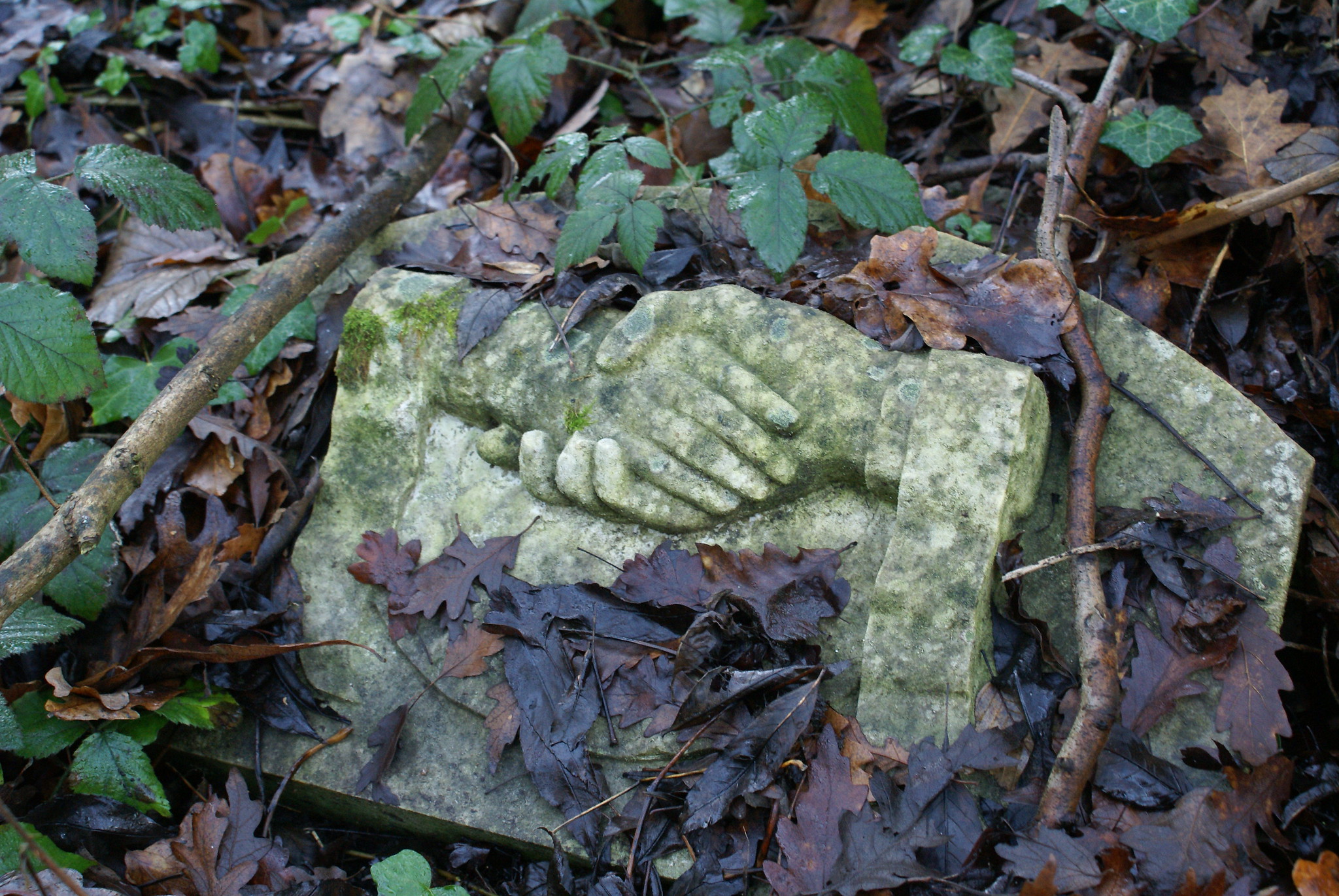by Callum Aitken
The Pale Glade is a story inspired by stories; it aims to follow in the footsteps of myth and folk tales, tied as they are to the nature that binds us all. The story developed over a few months, sketched out in musings as I walked the rich, wild cemeteries of south London, places that seem to forget the rampant modern development surrounding them, and in turn thankfully seem to have been forgotten by that same development. They are sacred spaces in more ways than one, places to correspond with those strange others that share the places we call home. London is a ‘strange nature’ in itself; lichens living on pavements meet tropical parakeets living in poplars and foxes feeding on fried chicken. New ecologies emerge and meet ecologies of old; these cemeteries are some of the remains of the ancient Great North Wood of south-east England. It has felt an appropriate place for this story to unfold.
Following the tradition of oral storytelling, there is also a recording of the tale told in a cemetery. The story as written below is the only time it has existed in this form – I find every time I tell it, or write it down, it changes. Stories have a life of their own, and oral traditions sustained this beating heart, told differently each time by each teller, and for each audience. And so, I ask of you to keep this story alive – go forth and tell it, and tell it your way. Bring your own strange and wonderful nature to the telling, and let the tradition live on.
There was once a man who told stories. He was a great, proud man; face full of beard and belly full of beer, he travelled about the towns and villages telling tales new and old. In his wanderings between settlements, he explored wild and ancient places; delved into forests thick with moss and mist, crossed rivers filled with fervent icy waters, bedded down in caves, with fox, and bear. He knew the world well enough, but with this knowledge came an occasional hubris, an arrogance among the towndwellers.
One day, upon such a wandering between the places of humans, the bard came to the edge of a forest – dark, green, and old. Instinct told the bard that this place was older than most, sacred to the horned gods since forgotten, perhaps. Instinct told the bard not to go in. Shaking his head, and smirking to himself, he ventured further in.

As the bard kept going, the undergrowth grew thicker, and the going grew tougher. Soon he was lost, and tired. The bard walked beneath two grand oaks; old, old beings twisted and intertwined. Grown together. The wind wailed in the leaves high in the canopy above. Beyond the grandmother oaks, there was a clearing. A glade of pale light, a single tree at its centre, shaggy with bark and muscular branches like the limbs of a bear. This must be the place.
Crows squawk and branches creak in the pale glade. The bard sits, weary from the long journey, and as he does so, an elder steps right out of the tree. Gnarled and bent, with wild locks of wolf fur, slender twisted twigfingers, and green eyes, green like moss-laden stone, the old one coughs an ivy breath, stares deep into the bard’s eyes and starts to tell him a story.
It is a tale at once beautiful and horrifying; magnificent, yet terrible. It is full of hope, steeped long and hard in despair. The elder had spoken a story tipped with morning dew and dart frog venom. It sparks tears in the bard’s eyes; he turns and runs. In that moment, he knows only two things: that he must leave this place, and that he can never tell the story the ancestor has told to him.
After days lost in the wood, panicked as prey, the bard made it back into the nearby town. He enters the inn, takes a room, and sleeps. Days pass again. Days filled with dreams of dark forest floors growing beneath his surface. When he finally awakens, the bard sits in the hall and eats and drinks furiously. Sated and quenched, he stands to tell a story.
The bard walks to the back wall of the mead hall. He clears his throat. The patrons quieten, and wait. The bard decides to take it easy, tells a story he and the audience know well. He starts to recount the tale, but it is somehow different, changed. The musk of what he heard in the woods tinges the words, and behind them lurks a darkness, and a wild, fierce beauty. As he finishes the telling, the audience remains silent. There are tears in many eyes. The bard had unlocked something in his telling.
And so life goes on. Years passed, and the storyteller continued to travel and tell his stories. The stories continued to grow, darker and more compelling. His fame grew too, and with it returned his hubris. The bard did not forget that day in the pale glade, but the memory had faded somewhat. One night, the bard was telling stories to yet another packed house. The stories were receiving a great reception, and he was urged to continue telling late into the night. Everyone – men, women and children – were sat comfortably listening, bathed in the warm glow of the mead hall hearth.
All, except for one young girl, who stood quietly by the door. Her hair was wild, lupine locks matted with broken twigs, and her stonegreen eyes pierced him with hawthorn barbs. She was lit in the pale green light of dappled leaves. As the night wore on, and just a few of us patrons remained, dozing by the fire, and the bard was still telling stories, one eye always on the child by the door.
Eventually, the girl walked towards the bard. She stopped halfway down the hall, and spoke. “Tell the story,” she said, “Tell us what you saw in the pale glade between the two grandmother oaks.” Chill fear dragged its cold finger down his spine – you could see it on his face. He whispered, “No.” The girl walked closer again, and stopped. “Tell the story,” she said, “What did you see in the pale glade beyond the two grandmother oaks?” The bard can see the twigs in her hair and the dark mud caking her feet. “I can’t tell you,” he stammers in response.
The girl walked right up to him, still looking into his eyes. The bard can smell the humus and feel the lichen beneath his clothes. She says again, “Tell us the story. Tell us what you saw in the pale glade, beyond the two grandmother oaks.”
The bard finally sighs and, fearful, begins to recount the tale. He feels the whiskers of his beard tighten, drawn out in tangible growth. He chokes on ivy and root. The fear grows as he tries desperately to prevent the ancient movement of his tongue, now rough with spines. Moss and mycelium mat the fur streaking his back. His hands snap back, his fingers contract; the keratin of his nails is squeezed together, becoming hard and sharp as claws. He growls through fangs bared. His eyes blinked, flashing yellow, then green, pupils vertical. He is shifted; shifting. The bard stumbles out the side door of the inn, into the shadow of night, and runs from the town, blood pounding with adrenaline. But amidst the fear, there was something else. A sensation completely other, of vine and talon, of hyphae and scale; and yet, undoubtedly familiar, tied with hair and flesh and blood. He felt a comfort he did not realise he lacked; a belonging and a longing, to be intertwined.
He ran, first on two legs, then on four, deep into the woods, bounding through foliage and along scent trails, following nose and instinct, joy and terror meeting and joining in the thrill of the chase, and the chased. He galloped past the two grandmother oaks, grown together, into the dappled light of the pale glade. The bard ran to the tree at its centre, that smiling elder, and dived at its heart, falling long and deep into its embrace.
And there it is he remains; a horned god since forgotten, perhaps.
Listen
Listen to the audio of this story, recorded by the author.
Cover photo: hands by Bridget McKenzie (cc by-nc 2.0)
This article is part of our season on Strange Natures.
